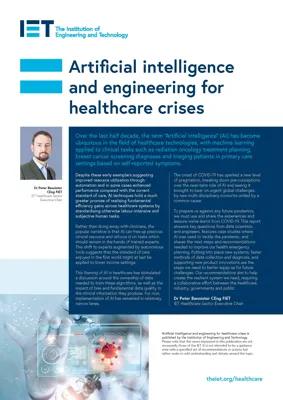Artificial intelligence and engineering for healthcare crises

Over the last half-decade, the term “Artificial Intelligence” (AI) has become ubiquitous in the field of healthcare technologies, with machine learning applied to clinical tasks such as radiation oncology treatment planning, breast cancer screening diagnoses and triaging patients in primary care settings based on self-reported symptoms.
The onset of COVID-19 has sparked a new level of pragmatism, breaking down pre-conceptions over the near-term role of AI and seeing it brought to bear on urgent global challenges by new multi-disciplinary consortia united by a common cause.
To prepare us against any future pandemics, we must use and share the experiences and lessons we’ve learnt from COVID-19.
This report answers key questions from data scientists and engineers, features case studies where AI was used to tackle the pandemic and shares the next steps and recommendations needed to improve our health emergency planning.
Putting into place new systems, faster methods of data collection and diagnosis, and supporting new product innovations are the steps we need to better equip us for future challenges.
Our recommendations aim to help create the resilient system we need, requiring a collaborative effort between the healthcare industry, governments and public.
